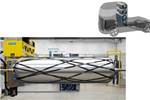SwRI announces JIP to spur H2 refueling, infrastructure tech for heavy-duty vehicles
SwRI’s H2HD REFUEL 4-year project is underway to advance H2 refueling and explore potential alternatives via system modeling, experiments and theoretical studies.
The H2-ICE consortium completed construction of a hydrogen internal combustion engine-powered heavy-duty vehicle and an on-site 17,000-gallon liquid H2 storage tank. These capabilities will aid the H2HD Refuel JIP’s efforts. Source | Southwest Research Institute
(SwRI, San Antonio, Texas, U.S.) has announced a joint industry project (JIP) that will reportedly help spur the growth and innovation of fueling technologies and infrastructure for hydrogen-powered heavy-duty vehicles.
SwRI’s H2HD REFUEL (Hydrogen Heavy Duty Refueling Equipment and Facilities Utilization Evaluation Laboratory) JIP aims to strengthen the acceptance of hydrogen (H2) fuel use by heavy-duty vehicles to help the mobility industry meet its decarbonization and zero-emissions goals by advancing H2 refueling station (HRS) technologies. Over the next 4 years, SwRI researchers will use hands-on experiments, system modeling and theoretical studies to strengthen existing HRS equipment and procedures and explore potential alternatives.
“There are less than 60 H2 refueling stations in the U.S., but only one or two currently exist that can meet the specific needs of heavy-duty H2-powered vehicles,” says Dr. Thomas E. Briggs Jr., Institute engineer with SwRI’s Powertrain Engineering Division. “Many light-duty H2 stations face significant technical challenges, including supply chain issues, mechanical failures and lack of infrastructure. Considering the multimillion-dollar investment per station, these issues reflect a significant technology gap that industry and government must bridge before building additional heavy-duty refueling stations.”
The H2HD REFUEL JIP hopes to address these issues by connecting H2 vehicle manufacturers, OEMs and refueling station operators to develop innovative, dependable and compatible HRS technologies.
The program will investigate a broad range of HRS-related topics to help solve existing technical challenges, such as discovering the best onboard H2 storage method: liquid H2, cryo-compressed H2 or H70 gas, and comparing the performances of HRS flow components. The JIP also plans to study H2 losses from cryogenic systems resulting from boil-off as well as system inefficiencies.
“Connecting industry stakeholders is vital to developing compatible and reliable H2 refueling technologies and associated infrastructure,” says Angel Wileman, the JIP’s project manager from SwRI’s Mechanical Engineering Division. “H2HD REFUEL’s comprehensive approach will ensure that the industry can meet the growing demand for heavy-duty H2 vehicles efficiently and safely.”
H2HD REFUEL members will benefit from access to SwRI-led research and H2 storage system models. Members can also participate in interactive workshops and biannual meetings for networking and knowledge sharing and gain valuable economic and performance insights for different H2 storage systems.
Learn more about how enable clients to pool their R&D dollars for pre-competitive research they can then apply to their products and services. For more information, visit the or contact .
Related Content
-
Braided thermoplastic composite H2 tanks with co-consolidated molded boss areas to fit EV battery space
BRYSON project demonstrates possible designs, automated manufacturing and low permeability concepts, including EVOH liner and novel PPA matrix.
-
Co-molding SMC with braided glass fiber demonstrates truck bed potential
Prepreg co-molding compound by IDI Composites International and A&P Technology enables new geometries and levels of strength and resiliency for automotive, mobility.
-
Honda begins production of 2025 CR-V e:FCEV with Type 4 hydrogen tanks in U.S.
Model includes new technologies produced at Performance Manufacturing Center (PMC) in Marysville, Ohio, which is part of Honda hydrogen business strategy that includes Class 8 trucks.






